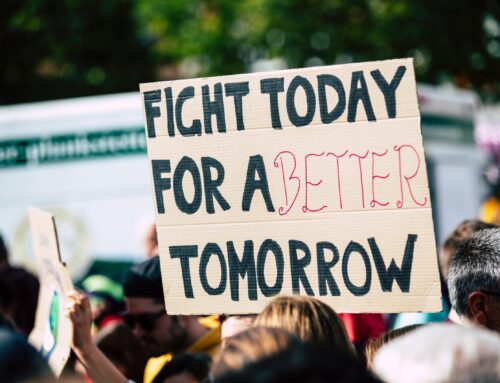Why?
Any number of questions asked in response to the outcomes of the 2024 national election start with that word, and any number of
While imagining what will happen after inauguration day in 2025 is not necessarily a trustworthy process, we do have evidence—data—that points toward certain likely actions and their consequences.
The sources of that evidence include the history of President-elect Trump’s first term in office, statements made by him or his campaign during the recent election, and the text in the “Project 2025” document (which, despite attempts by candidates to distance themselves from it, is clearly intended as a Republican handbook for change).
In general, President-elect Trump has focused on deregulation, less government intervention, leaving major policy matters to the states, greater accountability for institutions of higher education, and fostering alternatives to traditional four-year undergraduate college programs. Other Republican politicians—governors and state legislators—have also specifically addressed higher education, proposing (and often enacting) new state laws and regulations, and taking executive actions that target diversity, equity, and inclusion offices, diversity training, and teaching about race and gender (across the curriculum, in individual majors and courses, and in campus programming). More specifically:
- There has already been substantial incidents of intrusion into and interference with institutional strategy, management, hiring/appointments, and curricula on the basis of (1) the perceived importance, relevance, and value of certain majors and degrees, (2) the perceived earning power of students graduating with any of those majors and degrees, (3) the imputed financial, enrollment, or graduation performance of whole institutions or their individual schools, and/or (4) certain policies, positions, organizational structures, courses, or activities interpreted as being “woke.” Most notably: these actions represent harsh judgments about the value, relevance, and applicability of the liberal arts—especially, the humanities and social sciences.
- Efforts to hold institutions and their officers more accountable have already occurred and will likely accelerate and broaden in the new administration. Throughout 2024, there have been threatened or actual state and federal legislative investigations and hearings regarding diversity, equity, and inclusion policies, practices, positions, teaching, and programming on campuses as well as threatened or actual actions by media, influential donors, and/or wealthy members of governing boards designed to influence or control the decisions or actions of officers and administrators of colleges and universities. In particular, critiques of statements or actions (or the absence thereof) of presidents have become familiar (Harvard, MIT, Penn, Columbia), as have calls for the investigation and/or termination of them or other senior officers. J.D. Vance, the Vice President-elect, has said, “If any of us want to do the things that we want to do for our country,” he once said, “we have to honestly and aggressively attack the universities.” Republicans won a substantial majority of voters who have not had a college education.
- Project 2025 includes broad proposals for banning diversity, equity, and inclusion efforts (by outright discontinuation of DEI offices and programs and/or reducing or eliminating funding for them). It would also ban “woke gender ideology” and teaching or studying critical race theory in colleges and universities. Further, it would change federal rules to declare that gender is “sex defined at birth” and completely eliminate the federal Department of Education. We have seen implementation of such proposals at state level in full scale, most notably in Florida, Texas, and Utah. As of the end of October, there have been about 90 DEI-related bills introduced in state legislatures; at least 14 have become law. Most of those bills would restrict or eliminate DEI offices and staff positions, discontinue any mandatory DEI training, forbid the use of diversity statements, and outlaw identify-based preferences for hiring and admissions. Still, it remains true that disparities in educational achievement are not caused by racial/ethnic differences in cognitive ability and capacity. They are caused by social and economic inequities, differential access to resources, and oppressive cultures and systems. While it is reasonable (indeed essential) to assess the outcomes of DEI offices and programs, it is not at all reasonable to deny the need for action to eliminate those discrepancies.
- Anti-intellectual, anti-science, and anti-fact views and attitudes were pressing issues during the campaign and may cause negative changes in policy and disruptions in higher education funding (e.g., regarding vaccines, climate change, election denial, “fake news”). Think back, for example, to the false claims about Haitian immigrants in Springfield, OH.
- The Biden administration has proposed expansion of the protections provided under the Title IX rule, which says that, “No person in the United States shall, on the basis of sex, be excluded from participation in, be denied the benefits of, or be subjected to discrimination under any education program or activity receiving federal financial assistance.” Biden’s expansion of the rule would protect students from discrimination based on sexual orientation and gender identity, and expand protections from sex-based harassment to include “sexual violence and unwelcome sex-based conduct that creates a hostile environment by limiting or denying a person’s ability to participate in or benefit from a school’s education program or activity.” It would also enhance protections for students, employees and applicants against discrimination “based on pregnancy, childbirth, termination of pregnancy, lactation, related medical conditions, or recovery from these conditions.” It is likely that the new administration with overturn this proposal.
- Several Republican politicians and elected officials have sharply opposed support for, education about, and/or recognition of transgender persons. Even before the election, though, trans students have often felt under assault as their identities were questioned and vilified. Trans students (and trans faculty and staff) will have to depend on state-level protections, at least in the coming few years.
- What the administration’s final policy on abortion and reproductive rights will be remains unclear; contradictory statements and positions by candidates varied from “returning the question of abortion to the states” to advocacy for a broad federal ban on abortion. Voters in several states approved protections for reproductive rights in last week’s election, but many students still fear that they will lose control over their reproductive lives. State laws banning abortion (and, in at least one case, forbidding citizens to travel to other states for reproductive health care) are already requiring university health centers and their community partners to provide support and counsel to their students given the thicket of laws and regulations complicating reproductive health.
- Officers and investors in for-profit colleges and universities have celebrated the election results, believing that the second Trump administration will pull back from any significant attacks or limitations on their institutions, regardless of post-graduation consequences such as high levels of debt and failure to achieve gainful employment.
- While both presidential campaigns advocated fewer requirements for undergraduate college degrees for federal and private sector positions (e.g., Vice President Harris: “good-paying jobs are available to all Americans, not just those with college degrees”), there were fundamental differences in their planned approaches to doing that. Project 2025 includes proposals for a new, free, entirely online and “anti-woke” “American Academy” that would supplant current college programs; it would be funded by “taxing, fining, and suing” private institutions.
- The new administration will almost certainly not continue efforts to forgive students’ educational debt. It is equally likely that the second Trump administration will reduce federal loan funding through Pell grants and may eliminate the Public Service Loan Forgiveness Program. The fate of federal programs that can assist colleges and universities in responding to students’ basic needs (food, housing, transportation) is uncertain but also likely endangered.
- The American Association of University Professors (AAUP) has spoken out about how the new administration may undermine many of the central tenets of higher education. In a statement released just after the election, the president of that organization said, “We are deeply concerned that the ongoing crisis in higher education of declining public funding, ballooning student debt, and attacks on academic freedom will only be intensified under the incoming administration. Without a thriving, inclusive higher education system that serves the public good, the majority of Americans will be excluded from meaningful participation in our democracy and this country will move backwards…we will do everything in our power to protect our institutions, faculty, staff, and students and stand up against those seeking to violate academic freedom and the core principle of higher education conducted for the common good.”
I conclude the listing of probable consequences of the election with the AAUP’s statement for a serious reason, which is embodied in the greater “why?” questions I mentioned at the beginning of this discussion. I think of this because of the provocative title of a book about teaching by Mark Edmundson, PhD, a distinguished professor of English at the University of Virginia—“Why Teach?: In Defense of a Real Education” The message of his essays in that book—originally published in 2013—was that the liberal arts were more important then than ever, and that higher learning is not some staid, old notion but a necessary remedy for what he saw as our troubled times. He echoed the words of Martha Nussbaum, PhD, a philosopher and the Ernst Freund Distinguished Service Professor of Law and Ethics at the University of Chicago, whose book Cultivating Humanity (1998) argued that liberal education is not only viable, promising, and constructive, but is essential to a democratic society. More recently (in 2016), Nussbaum, in her later book Not for Profit: Why Democracy Needs the Humanities, attacked the shift in higher education that faculty often call “corporatization”; she wrote:
“We increasingly treat education as though its primary goal were to teach students to be economically productive, rather than to think critically and become knowledgeable, productive, and empathetic individuals. This shortsighted focus on profitable skills has eroded our ability to criticize authority, reduced our sympathy with the marginalized and different, and damaged our competence to deal with complex global problems.”
She called for resistance to efforts to “reduce education to a tool of the gross national product” and for “reconnecting education to the humanities in order to give students the capacity to be true democratic citizens of their countries and the world.”
It is exactly those principles that are at great risk if the new presidential administration directly or indirectly undermines the essential autonomy, perspective, and purpose of institutions of higher education.
As Inside Higher Ed put it, “The second Trump presidency is likely to amplify concerns about the value of postsecondary education and inflame public anger over campus culture issues.” Just before the election, the New York Times published an important article describing how “Faculty members are used to sharing power with presidents and trustees to run universities. But some presidents and lawmakers have made moves to reduce their say.” That trend—weakening the principles and practices of shared governance—parallels the intrusion of legislatures, governors, and governing boards into the management and operations of not-for-profit colleges and universities. And it prompts another version of the “why?” question—not just “why teach?” but “why learn?” and “why go to college?” The idea that a national online academy would replace higher learning as it can, and should, across the spectrum of colleges and universities is simply preposterous. Student development would become an endangered species.
All of that it raises one more final question: “why have a university?”, to which the answers have been, and remain, clear. John Henry, Cardinal Newman, in The Idea of a University (170 years ago, in 1852) argued that “The essence of a university lies in teaching,” and Martha Nussbaum, in her work, described the goal of that teaching briefly and eloquently: “We need…an education that cultivates the critical capacities, fosters a complex understanding of the world and its peoples, and educates and refines the capacity for sympathy — in short, an education that cultivates human beings and their humanity, rather than producing generations of useful machines.” Students—those amazing, wonderful people whom we serve so well despite limited resources and, often, inadequate support—deserve the opportunity not just to make money, but also to make a difference. Protecting that opportunity must be our primary goal in the years ahead.
Richard P. Keeling, MD, Chairman of Keeling & Associates, LLC, wrote this essay for the Council for the Advancement of Standards in Higher Education (CAS) and presented it at their Council of Representatives meeting on November 11, 2024.
Keeling & Associates, LLC is a comprehensive higher education consulting and professional services firm that creates “change for learning” through its consultation, advisory, and executive search professional services across North America. Let’s create change for learning together.






Leave A Comment